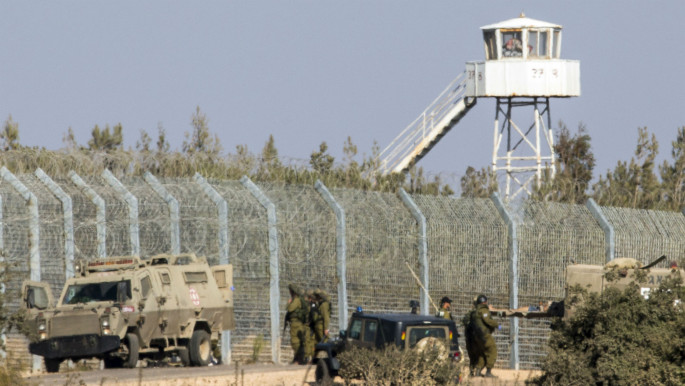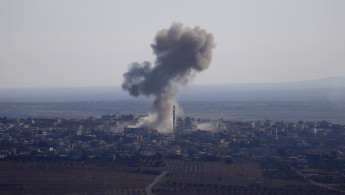Netanyahu: Israel carries out military operations in Syria
Prime Minister Benyamin Netanyahu admits to carrying out military operations, including air strikes, in Syria.
2 min read
Israel has admitted carrying out military operations in Syria, including airstrikes [Getty]
Prime Minister Benyamin Netanyahu has admitted for the first time that Israeli forces have been operating in Syria, where the Iran-backed regime is locked in a bloody war with rebel groups.
"We occasionally carry out operations in Syria to prevent that country from becoming a front against us," Netanyahu told reporters during a visit to northern Israel.
"We also do everything to prevent weapons, particularly lethal ones, being moved from Syria to Lebanon," he added.
Netanyahu did not provide further details and his comments were the first public recognition that Israel has been active militarily in war-torn Syria.
Several purported strikes have occurred in recent months, targeting alleged Iranian arms transfers from Syria to Lebanon destined for Hizbollah.
But these strikes were not officially acknowledged by Israeli authorities.
Russia, an ally of the Assad regime along with Iran, launched an air campaign against rebel groups in late September.
On Sunday, Defence Minister Moshe Yaalon said a Russian warplane had recently entered Israeli-controlled airspace from Syria but the intrusion was resolved without incident.
"It was apparently an error by the pilot who was flying near the Golan," Yaalon said.
Refering to the Russian entry into Israeli airspace, military analyst Amir Boubot said that Russia had "exploited the situation" and "struck while the iron was hot".
Israel seized most of the Golan Heights from Syria in 1967 and later annexed the territory in a move yet to be recognised by the international community.
Yaalon said Israel and Russia had made arrangements to avoid clashes over Syria, with the agreement said to include a "hotline" and information sharing.
Boubot said this agreement may involve Russia agreeing to prevent arms transfers from the Syrian regime to Hizbollah. However the analyst added that this is unlikely to be carried out in practice.
Netanyahu echoed Yaalon's comments on Tuesday, saying that Israeli and Russian military forces "are in close coordination to avoid such incidents".
Their remarks came in the aftermath of the downing by Turkey over a Russian warplane which Ankara said had entered Turkish airspace - a claim denied by Moscow.
"We occasionally carry out operations in Syria to prevent that country from becoming a front against us," Netanyahu told reporters during a visit to northern Israel.
"We also do everything to prevent weapons, particularly lethal ones, being moved from Syria to Lebanon," he added.
Netanyahu did not provide further details and his comments were the first public recognition that Israel has been active militarily in war-torn Syria.
 |
|
| Israel annexed the Syrian territory of the Golan Heights [Getty] |
But these strikes were not officially acknowledged by Israeli authorities.
Russia, an ally of the Assad regime along with Iran, launched an air campaign against rebel groups in late September.
On Sunday, Defence Minister Moshe Yaalon said a Russian warplane had recently entered Israeli-controlled airspace from Syria but the intrusion was resolved without incident.
"It was apparently an error by the pilot who was flying near the Golan," Yaalon said.
Refering to the Russian entry into Israeli airspace, military analyst Amir Boubot said that Russia had "exploited the situation" and "struck while the iron was hot".
Israel seized most of the Golan Heights from Syria in 1967 and later annexed the territory in a move yet to be recognised by the international community.
Yaalon said Israel and Russia had made arrangements to avoid clashes over Syria, with the agreement said to include a "hotline" and information sharing.
Boubot said this agreement may involve Russia agreeing to prevent arms transfers from the Syrian regime to Hizbollah. However the analyst added that this is unlikely to be carried out in practice.
Netanyahu echoed Yaalon's comments on Tuesday, saying that Israeli and Russian military forces "are in close coordination to avoid such incidents".
Their remarks came in the aftermath of the downing by Turkey over a Russian warplane which Ankara said had entered Turkish airspace - a claim denied by Moscow.





 Follow the Middle East's top stories in English at The New Arab on Google News
Follow the Middle East's top stories in English at The New Arab on Google News


